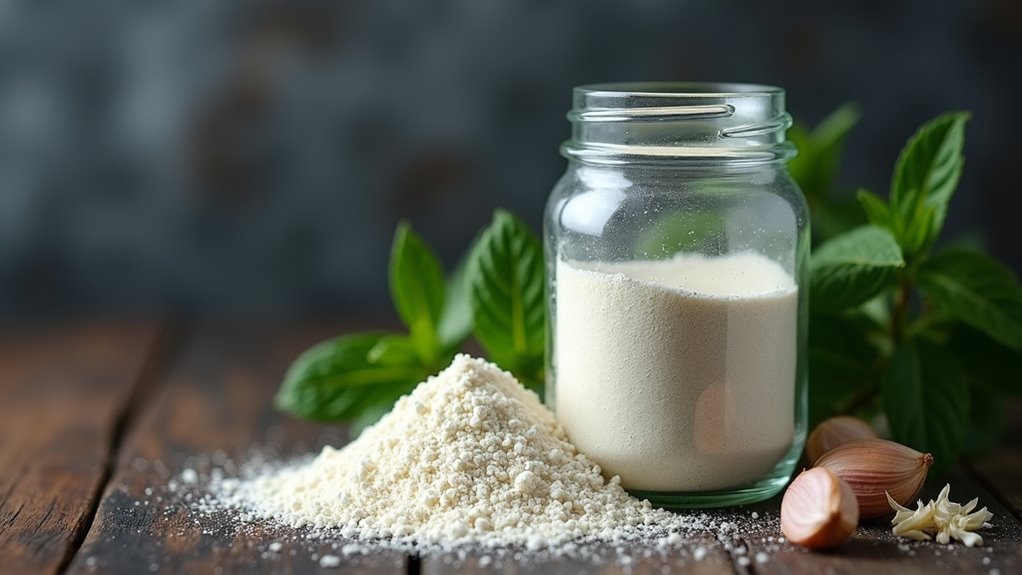You can create three powerful basement spider repellents using common household items. First, mix water with 10-15 drops of peppermint oil for a natural deterrent spray. Second, combine equal parts white vinegar and water to disrupt spiders’ sensory receptors. Third, sprinkle food-grade diatomaceous earth along entry points to create an effective physical barrier. Apply these mixtures around windowsills, doorways, and spider-prone corners, reapplying regularly for maximum effectiveness. Strategic application techniques will amplify these solutions’ potency.
Essential Oil Spider Repellent Spray for Basements

When spiders invade your basement, you can create an effective repellent spray using essential oils that’ll keep these unwanted visitors at bay.
Mix water with 10-15 drops of peppermint oil, which spiders hate due to its strong scent. You can also add tea tree oil, lavender, or eucalyptus oil for enhanced effectiveness. This non-toxic alternative to chemical repellents is safe for households with children and pets.
Apply your essential oil spray in corners, around entry points, and other spider-prone areas throughout your basement. For maximum results, you’ll need regular reapplication to maintain the scent barrier.
Consider combining essential oils with vinegar to boost repellent properties while gaining cleaning benefits that make your basement less attractive to spiders.
Vinegar-Based Spider Deterrent Solution
While essential oils provide one effective approach to spider control, you can also create a powerful deterrent using common household vinegar. This acidic solution disrupts spiders’ sensory receptors, making your basement uninviting to these unwanted visitors.
Mix equal parts white vinegar and water in a spray bottle for an effective spider repellent. The acidic nature of this mixture creates an environment spiders avoid while safely cleaning surfaces throughout your home.
White vinegar’s acidic properties create an unwelcoming environment for spiders while providing a safe, natural cleaning solution for your home.
Apply the solution around windowsills, doorways, and other potential entry points where spiders typically enter. This deterrent also removes insect trails that attract spiders to your basement.
You’ll need to reapply regularly, especially after cleaning or if areas get wet, to maintain the repellent’s effectiveness against basement spider infestations.
Diatomaceous Earth Barrier Treatment

Beyond liquid repellents, diatomaceous earth offers a physical barrier approach that mechanically dehydrates spiders on contact. This food-grade powder provides an eco-friendly option that’s safe around children and pets.
For effective spider control, create a barrier treatment by sprinkling diatomaceous earth along entry points including windowsills, doorways, and basement perimeters where you determine spider activity occurs.
The powder absorbs lipids from spider exoskeletons, making it highly effective for basement environments. However, you’ll need to reapply regularly since moisture and disturbance reduce its effectiveness.
To maintain your protective barrier, check treated areas weekly and refresh as needed. You can enhance results by combining diatomaceous earth with other natural repellents like essential oils, creating a thorough spider control system.
Frequently Asked Questions
What Can I Spray in My Basement to Keep Spiders Out?
You can spray equal parts white vinegar and water in corners and entry points. Alternatively, you’ll find peppermint, tea tree, or eucalyptus essential oils diluted in water create effective repellent sprays that disrupt spiders’ senses.
What Homemade Spider Repellent Actually Works?
You’ll find peppermint oil mixed with water works effectively as spiders hate the scent. White vinegar solutions also disrupt their sensory receptors, while diatomaceous earth creates deadly barriers they can’t cross safely.
What Smell Do Spiders Absolutely Hate?
You’ll find that spiders absolutely hate peppermint’s strong scent, along with eucalyptus, tea tree, and lavender oils. They also can’t stand vinegar’s acidic smell or cedar wood’s aromatic properties, which disrupt their sensory receptors.
What Do Professionals Use to Spray for Spiders?
Professionals typically spray pyrethroids or neonicotinoids for spiders, as they’re highly effective against black widows and brown recluses. You’ll find they use residual sprays lasting weeks, combined with IPM techniques for thorough control.
In Summary
You’ve now got three proven methods to keep spiders out of your basement. Start with the essential oil spray for immediate results, then apply the vinegar solution to problem areas. Set up diatomaceous earth barriers around entry points for long-term protection. Rotate between these treatments every few weeks to prevent spiders from adapting. With consistent application, you’ll notice fewer unwanted eight-legged visitors in your basement space.





Leave a Reply